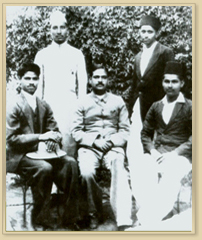You are here : Home >> About Pandit ji >> Childhood
Deendayal Upadhyaya's ji childhood was spent in an ordinary North Indian lower middle class Hindu household that believed in Sanatan faith. His great-grandfather, a renowed astrologer, Pandit Hariram Upadhyaya, lived in Nagla Chandrabhan village in Mathura district. His younger brother was Shri Jhandu Ram. Pandit Hariram Upadhyaya had three sons - Bhudev, Ram Prasad and Ram Pyare; Jhandu Ram had two sons - Shankarlal and Banshilal.  Shri Bhagwati Prasad was the son of Shri Ram Prasad. He was married to Shrimati Rampyari, who was a religious-minded lady. Deendayalji was born to them on Sept. 25, 1916 (Ashwin Krishna Trayodashi, Samvat 1973). His full name was Deendayal Upadhyaya, but he was called Deena by the family. Two years later, Rampyari gave birth to her second son, Shivdayal alias Shibu. Shri Bhagwati Prasad was the son of Shri Ram Prasad. He was married to Shrimati Rampyari, who was a religious-minded lady. Deendayalji was born to them on Sept. 25, 1916 (Ashwin Krishna Trayodashi, Samvat 1973). His full name was Deendayal Upadhyaya, but he was called Deena by the family. Two years later, Rampyari gave birth to her second son, Shivdayal alias Shibu.The joint family system still continued in Pandit Hariram’s family. It was, thus, a large family in which women generally bickered all the time over division of household work. Deendayalji was about two-and-half when his father, Bhagwati Prasad, was Assistant Station Master at Jalesar. He called his aunt stepmother to Jalesar to lessen the bickering among the women folk at home. Deena, Shibu and Rampyari’s were sent to the Dhankiya village in Rajasthan, where Rampyari's father Chunnilal’s Shukla, was the Station Master. Chunnilal’s village, i.e., Rampyari's maternal place and Deendayal’s ji maternal grandfather's place, was Gud Ki Mandhai, near Fatehpur Sikri in Agra District. Separated from his paternal roots at Mathura at the age of two-and-a-half, Deendayalji never returned there. He was brought up and educated at his maternal grandfather place under conditions of extreme suffering and deprivation conditions that would cow down any ordinary mortal. But Deendayalji drew strength from the negative forces and sufferings around him and developed a unique personality. His life was a reflection of his trials in early childhood; it typified how a person could rise above his circumstances through sheer grit and determination. When a living human being faces death, he becomes disinterested in life. Deendayal Upadhyaya ji came across the deaths of his close ones right since childhood. As stated earlier, he had come to live with his maternal grandfather at the age of two-and-a-half. Shortly thereafter, came the news that his father, Bhagwati Prasad had expired. He became fatherless and Rampyari a widow. Sitting in her lap, the child Deendayalji keenly observed his widowed mother's tears and his maternal grandfather's helplessness at his young son-in-law's untimely death. His psyche must have been deeply affected by this tragedy. He spent his childhood, deprived of the love and care of his father, under the protection of his mother. But the widow Rampyari, worn out by her worries and sorrow, soon became a victim of the dreaded tuberculosis. At this time, tuberculosis meant sure death. Deendayalji was just seven and his younger brother Shivdayal five, when Rampyari died, leaving the two orphans to the care of their grandfather. Deendayalji was thus deprived of the love and affection of both his parents at an early age. Destiny perhaps has in store more encounters with death for the young Deendayalji. Two years after Rampyari's death, her father Chunnilal, who was bringing up her two sons as a legacy of his dead daughter, also passed away in September 1926. Deendayalji was in his tenth year at that time. He was thus bereft the love and affection of both his parents and his maternal grandfather. He started living with his maternal uncle. Deendayal's ji aunt was sensitive to the feelings of two brothers; she brought them up like her own children. She became a surrogate mother to the orphans. When he was just seven or eight, dacoits raided his house. One of them pushed aside his aunt’s chest and demanded ornaments that were there in the house after felling down Deendayalji and stomping upon his chest. Wriggling under the dacoit, Deendayalji softly told him, ''we had hearth that dacoits rob only the rich and protect the poor. But you are hurting a poor creature like me. The leader of the gang was impressed with the child’s fearlessness; he returned with his gang without robbing the house. (Excerpts from the book -" Pandit Deendayal Upadhyaya" written by Dr. Mahesh Chandra Sharma) |
Home | About Pandit Ji | Books | Letters | Articles | Speeches | Quotes | Photo Gallery | Seva Karya | Contact Us
Compiled by Amarjeet Singh, Research Associate & Programme Coordinator, Dr. Syama Prasad Mookerjee Research Foundation, 9, Ashok Road, New Delhi - 110001
Content copyright © Dr. Syama Prasad Mookerjee Research Foundation
Designed & Developed by Dreamlabz Technologies

